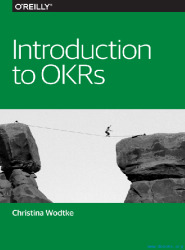Introduction to OKRs
Download free course Introduction to OKRs, pdf file on 37 pages by Christina Wodtke.
With examples from several companies, including Google, Duxter, and Zynga, author and consultant Christina Wodtke walks you through the process of selecting short and aspirational objectives, along with difficult-but-achievable key results to quantify each objective. You'll also learn how to inspire team members by baking OKRs into the daily and weekly cadence of your team.
- Create team objectives that are qualitative, inspirational, time-bound, and independently actionable;
- Quantify and define the success of each objective with three key results;
- Adopt OKRs to help your team achieve focus, alignment, or acceleration;
- Learn a practical method for having your team choose objectives each quarter;
- Track and evaluate OKRs through weekly confidence ratings, Friday "wins" meetings, and end-of-quarter grading;
- Introduce OKRs in your organization gradually to help your team master the process.
Table of contents
-
Introduction
-
An Extremely Short History of OKRs
-
How to Hold a Meeting to Set OKRs for the Quarter
-
Improve Weekly Status Emails with OKRs
-
Getting Started with OKRs
| Pages : | 37 |
| Size : | 2.1 MB |
| File type : | |
| Downloads: | 109 |
| Created: | 2022-02-03 |
| License: | Open Publication License |
| Author(s): | Christina Wodtke |

Warning: Trying to access array offset on false in /home/tutovnfz/public_html/article.php on line 233
Others Computer science, Data recovery Tutorials
Others related eBooks about Introduction to OKRs
Defend DissentDownload free course Defend Dissent, pdf file on 131 pages by Glencora Borradaile....
Bayesian Methods for Hackers: Probabilistic Programming and Bayesian Inference Using Python and PyMCMaster Bayesian Inference through Practical Examples and Computation - Without Advanced Mathematical Analysis....
Case Studies in Infrastructure Change ManagementDownload free course Case Studies in Infrastructure Change Management, pdf file on 40 pages by by Wendy Look, Mark Dallman....
Fundamental Approaches to Software EngineeringDownload free course Fundamental Approaches to Software Engineering, pdf file on 361 pages by Alessandra Russo, Andy Schürr....
Notes on Diffy Qs: Differential Equations for EngineersAn introductory course on differential equations aimed at engineers. The book covers first order ODEs, higher order linear ODEs, systems of ODEs, Fourier series and PDEs, eigenvalue problems, the Laplace transform, and power series methods. The book originated as class notes for Math 286 at the Univ...
Open Data Structures: An IntroductionOffered as an introduction to the field of data structures and algorithms, Open Data Structures covers the implementation and analysis of data structures for sequences (lists), queues, priority queues, unordered dictionaries, ordered dictionaries, and graphs. ...
Migrating Big Data Analytics into the CloudDownload free course Migrating Big Data Analytics into the Cloud, pdf file on 16 pages by Mike Barlow....
The Brain of the ComputerThe purpose of the book is to take a basic computer system and show you how every part works. It is taught from a technicians point of view, not an engineer's. These are the things that are taught in the book. Digital electronic components, digital logic circuits, CPU theory, computer system theor...
Introduction to Mathematical LogicThis book explores the principal topics of mathematical logic. It covers propositional logic, first-order logic, first-order number theory, axiomatic set theory, and the theory of computability. The text also discusses the major results of Gödel, Church, Kleene, Rosser, and Turing....
Pro Git, 2nd EditionPro Git (2nd Edition) is your fully-updated guide to Git and its usage in the modern world..., download free Git tutorial in PDF (456 pages) created by Scott Chacon ....